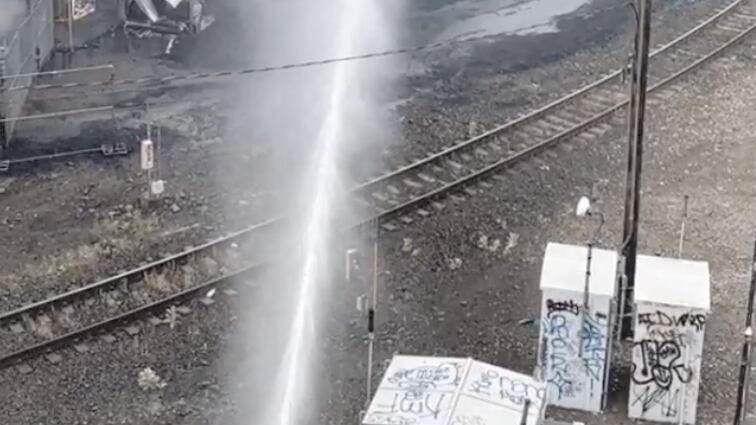For the third time in six days, the massive pile of shredded tires sitting beside an old grain elevator on the Willamette River reignited this morning, sending flames and smoke into the spring air.
Crews from Portland Fire & Rescue have visited the site at least three times in the past week, dousing flames with thousands of gallons of water, fire spokesman Rick Graves said.
The pile is out of compliance with regulations, Graves said. “The size of the pile is greater than what we would permit,” he said. “The permit is under review.”
It’s the size that makes the heap ripe for burning and difficult to extinguish. The owners of the grain elevator use the site to ship shredded tires to Asia, where they are burned to generate electricity. In a huge pile, the shreds—and the air pockets between them—make a near-perfect setup for conflagration, Graves said.
Dousing the fire quells the flames for a short time, but if the center is hot enough, the fire can reignite soon after fire hoses are rolled up, as happened this week.
“It’s a matrix,” Graves said. “It’s a pile of little pebbles. If you drop water in the top, it will get the hot spots for the time being. But because there are no sidewalls, you can’t keep the water in it.”
The tire pile is owned by Beau Blixseth and Chandos Mahon. Blixseth is the son of Tim Blixseth, a Roseburg timber baron who used his millions to start the Yellowstone Club, the private ski resort in Montana.
Mahon, a Columbia Business School graduate, runs Castle Tire Recycling, a North Portland company that collects and shreds tires. Before joining an affiliate called Castle Capital in 2015, Mahon was vice president at a company called Integrated Media Technologies, according to his LinkedIn profile. From 1998 to 2003, he was a professional motocross racer, the profile says.
In an interview with WW last year, Blixseth described the grain elevator as a screaming deal. It has a mysterious history. Starting around 2013, global grain merchant Louis Dreyfus Co. spent $21.5 million to renovate the facility. Then, in June 2019, it turned around and sold it for just $164,000 to a company called Rabin Worldwide that specializes in auctioning off industrial properties and equipment.
Seeing a diamond in the rough, Blixseth and Mahon bought the complex for $2.9 million through an entity called Castle Arden 1 LLC. Blixseth told WW that he wanted to ship grain from the site, as Louis Dreyfus had, but Union Pacific stopped running rail service to the elevator because a turn in the tracks there was dangerous. Blixseth said he didn’t learn about Union Pacific’s move until after he bought the property.
Soon after, the tire piles started forming. They build up until a ship docks and loaders fill the hold.
Blixseth hasn’t returned messages seeking comment. In an email Monday, Mahon said the fire was started by an arsonist. Pressed for proof on Tuesday, he didn’t reply. The fire bureau says the cause is under investigation.
The terminal appears to have been operating within the law. After coverage by WW, inspectors from the Oregon Department of Environmental Quality showed up unannounced Aug. 4, but found no violations.
“They observed two piles of tire-shred product,” DEQ spokeswoman Lauren Wirtis wrote in an email to WW at the time. “No tire shreds were visible outside of the two piles. DEQ inspectors did not observe any visible dust or odor during their visit.”
The DEQ inspection came after a Portland resident told WW he went on a run past the terminal in July and encountered dust and the stench of rubber (“Rubber Room,” WW, July 27). One thing had changed in the interim: A ship taking on tire shreds had left two weeks earlier.
DEQ regulates the location in North Portland where Castle Tire shreds the tires, DEQ spokesman Harry Esteve said today. But the site on the river doesn’t need a DEQ permit to store waste tires because the shredded tires are considered a product, not waste, Esteve said in an email.
“DEQ is going to inspect the site when it is safe to do so and determine if there are environmental violations,” Esteve wrote.
A spokesman for City Commissioner Rene Gonzalez, who heads the fire bureau, didn’t immediately reply to an email seeking comment.
In addition to the size-of-pile violation, the fire bureau had cited Blixseth and Mahon for not providing sufficient access to the site in the event of a fire, Graves, the fire spokesman said.
“They were very responsive,” Graves said. “Whatever needed to be done was done.”

